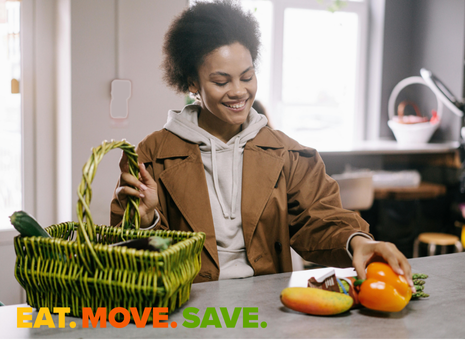
It has happened to all of us. We had to throw away leftovers, a food item spoiled in the fridge, or a pantry item went stale. When food is thrown away, your money is being thrown away, too. How can you keep this from happening?
Here are some tips to help save money and make sure all the food you buy is eaten.
Freezer Storage
Make your freezer your friend! Food in your fridge, like leftovers, fruits, vegetables, or meat, may go bad soon. Try storing it in the freezer and use it later. This will save money and keep you from buying foods that may have gone to waste again. Some foods can last in the freezer for months. For example:
Fruits like berries, bananas, pineapple, mango, and peaches freeze well. They can be used to make a great smoothie!
Freeze uncooked vegetables and add them to another dish later.
Leftovers
Leftovers can go in the freezer, but they can also be reused! Leftover vegetables, meats, and grains can be used to create a new meal. Making a new meal will help save money by wasting less. It will also give you new types of meals for the week. Some ideas are:
Take leftover vegetables and add them to a stir fry or soup.
Add leftover chicken or fish to a salad or wrap.
Leftover rice can be made into fried rice, paired with eggs, meat, or tofu.
Bulk Buying
Buying foods in bulk can be a good value if it means a cheaper unit price. Just make sure you will be able to eat them before they spoil or get stale. Shelf-stable and frozen items are the best foods to buy in bulk because they will last the longest. Examples include:
Grains like pasta, rice, and quinoa.
Canned and jarred items like pasta sauce, condiments, canned vegetables and fruits, and nut butters.
Staple items like broths, oils, and seasonings.
Frozen items like fruits, vegetables, meats, and quick cook items.
Storing Food Properly
It is important to store food in a way that keeps it from spoiling too quickly. Here are some helpful storage tips:
Keep fruits and vegetables in the drawer of the refrigerator.
Store onions and potatoes in a cool dry place, outside of the refrigerator.
Seal pantry bags shut with the reusable seal or a clip on the bag.
Store fresh meat on the bottom shelf of the refrigerator. Freeze meats if they are not cooked within a couple of days of purchase.
“Best by” and “Use by” Dates
Knowing the difference between “Best by” and “Use by” dates can help you cut back on food waste.
“Best by” means that the food is at its best quality and appearance before that date. However, it is usually safe to eat if there are no foul smells or visible bruise marks.
“Use by” is related to food safety, so it’s more important to pay attention to the “Use by” date. Sometimes, you can use foods past the “Use by” date on the label, but it is still smart to check for signs of the food going bad. Often, food items will spoil past the “Use by” date. When in doubt, throw it out.
Small changes like these can make big changes to your money-saving habits. You will waste less food and make the most out of your groceries. Check out the food savings calculator on our website to get a low-cost food plan!

